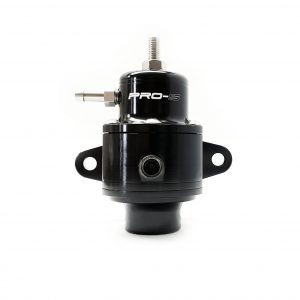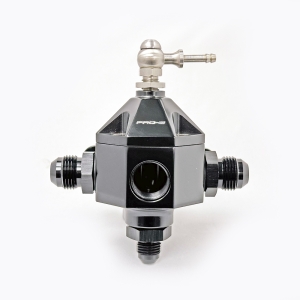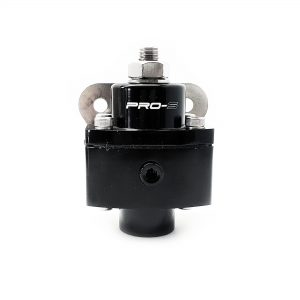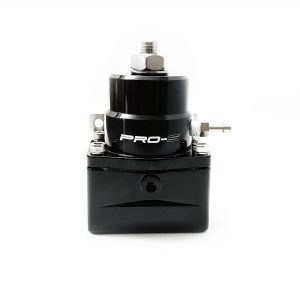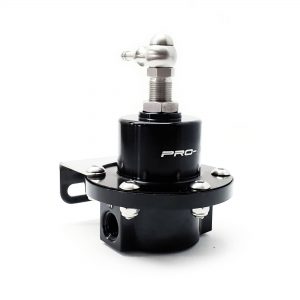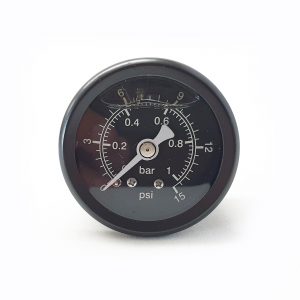Fuel Pressure Regulators
-
Fuel Pressure Regulators
PRO-S Billet 3 Port EFI Pressure Fuel Regulator
Rated 0 out of 5€168.50 incl. VAT Add to cart -
Fuel Pressure Regulators
PRO-S Billet 4 Port EFI Pressure Fuel Regulator
Rated 0 out of 5€175.58 incl. VAT Add to cart -
Fuel Pressure Regulators
PRO-S Billet Carb 2 Port Fuel Pressure Regulator
Rated 0 out of 5€154.34 incl. VAT Add to cart -
Fuel Pressure Regulators
PRO-S Billet EFI Fuel Pressure Regulator
Rated 0 out of 5€154.34 incl. VAT Select options -
Fuel Pressure Regulators
PRO-S Billet EFI High Pressure Fuel Regulator
Rated 0 out of 5€182.66 incl. VAT Select options
What is a fuel pressure regulator?
Found in all internal combustion engines, a fuel pressure regulator manages the engine through the car’s fuel system. Its main purpose is to regulate the pressure of fuel that flows through the system. And because various engines require various amounts of fuel, this can be managed by adjusting the fuel pressure.
Apart from merely regulating the fuel pressure, the component also ensures that any excess fuel returns to the fuel surge tank. Fuel pressure regulators are also connected to the vehicle’s internal computer, thus scanning the fuel line for any damages and leaks that could potentially be disastrous to you and the vehicle. Modern vehicles normally have a fuel pressure regulator already installed as the standard. Fuel passes from the fuel filter to the fuel rails which direct flow to the regulator to asses the flow of the engine.
What are some issues that can be found in fuel pressure regulators?
It’s important to know that fuel pressure regulators are directly connected to how fuel is evenly distributed in the engine. Once any issues with the component comes up, it can manifest as performance issues later on.
1. Misfires
Fuel-related or ignition-related issues usually lead to one or more of the cylinders failing. This leads to the engine jerking and stuttering if you will.
2. Reduction in power, acceleration and fuel efficiency
Any problems with the fuel pressure regulator will manifest in the vehicle’s fuel pressure. Because of this, the air-fuel ratio is no longer optimal or balanced, resulting in the decrease of power and acceleration, and the lack of fuel efficiency.
3. Fuel leaks
Once any of the fuel pressure regulator’s seals, or especially its diaphragm is problematic, the fuel may leak out and is ostensibly a safety hazard in itself. This problem can be detected by the smell of the fuel and performance issues with the engine. These same issues can occur due to a leaking fuel cap so make sure to check that as well during diagnostics.
4. Black smoke
Once the fuel pressure regulator fails or starts to show problems from a leak perhaps, the vehicle normally emits black smoke from the exhaust. Although black smoke is a tell-tale sign of vehicular complications, it is not specific to issues with the fuel pressure regulator but can be a part of the problem.
Choosing the right fuel pressure regulator
A fuel pressure regulator is supposed to last as long as your car does, given it comes as a standard in all modern models. However, with the less-than-ideal conditions that modern vehicles are exposed to such as day-to-day traffic, its parts, including the fuel pressure regulator, become worn out before they are actually due.
So, when replacing the fuel pressure regulator, it becomes imperative to choose one that can withstand the beating that a vehicle goes through. Larger fuel pressure regulators can handle more fuel flow and even higher pressure. And even more expensive fuel pressure regulators can be harder as they can withstand a variety of fuels including alcohol-based ones like ethanol and methanol. Cheap copies can pose problems later on because being exposed to alcohol-based fuels often cause leaks in the diaphragm of the regulator and thus cause some serious damage to the engine.


